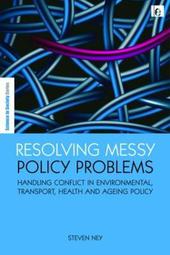
|
Resolving Messy Policy Problems: Handling Conflict in Environmental, Transport, Health and Ageing Policy
Hardback
Main Details
| Title |
Resolving Messy Policy Problems: Handling Conflict in Environmental, Transport, Health and Ageing Policy
|
| Authors and Contributors |
By (author) Steven Ney
|
| Series | Science in Society Series |
|---|
| Physical Properties |
| Format:Hardback | | Pages:224 | | Dimensions(mm): Height 234,Width 156 |
|
| Category/Genre | Social impact of environmental issues |
|---|
| ISBN/Barcode |
9781844075669
|
| Classifications | Dewey:320.6 |
|---|
| Audience | | Undergraduate | | Postgraduate, Research & Scholarly | | Professional & Vocational | |
|---|
| Illustrations |
Figures, tables, index
|
|
Publishing Details |
| Publisher |
Taylor & Francis Ltd
|
| Imprint |
Earthscan Ltd
|
| Publication Date |
22 April 2009 |
| Publication Country |
United Kingdom
|
Description
Our lives increasingly take place in ever more complex and interconnected networks that blur the boundaries we have traditionally used to define our social and political spaces. Accordingly, the policy problems that governments are called upon to deal with have become less clear-cut and far messier. This is particularly the case with climate change, environmental policy, transport, health and ageing - all areas in which the tried-and-tested linear policy solutions are increasingly inadequate or failing. What makes messy policy problems particularly uncomfortable for policy makers is that science and scientific knowledge have themselves become sources of uncertainty and ambiguity. Indeed what is to count as a 'rational solution' is itself now the subject of considerable debate and controversy. This book focuses on the intractable conflict that characterises policy debate about messy issues. The author first develops a framework for analysing these conflicts and then applies the conceptual framework to four very different policy issues: the environment - focussing on climate change - as well as transport, ageing and health. Using evidence from Europe, North America and the Asia-Pacific, the book compares how policy actors construct contending narratives in order to make sense of, and deal with, messy challenges. In the final section the author discusses the implications of the analysis for collective learning and adaptation processes. The aim is to contribute to a more refined understanding of policy-making in the face of uncertainty and, most importantly, to provide practical methods for critical reflection on policy and to point to sustainable adaptation pathways and learning mechanisms for policy formulation.
Author Biography
Steven Ney is Assistant Professor of Political Science at the School of Social Sciences, Singapore Management University. Trained as a policy analyst, Steven Ney has worked on a wide range of policy issues in a number of research institutes across Europe.
Reviews'This book should be read by anyone attempting to understand why policies often do not work.' B. Guy Peters, University of Pittsburgh and Zeppelin University, Germany 'The field of policy studies is knee-deep in turgid texts, but this is not one of them. Ney guides us through all the theories, pointing out where they converge and where they conflict, and ending with a subsuming tour de force in which he refurbishes the classic theory of pluralist democracy by pinning down just what it is that constitutes the plurality.' Michael Thompson, International Institute for Applied Systems Analysis, Laxenburg, Austria and Institute for Science, Innovation and Society, Said Business School, University of Oxford 'Steven Ney has produced an extremely important study of contemporary public policy. He points out the extent to which the most significant policy problems facing governments and society are complex and are not subject to neat, linear solutions. This book should be read by anyone attempting to understand why policies often do not work, and how they might be made to work more effectively.' B. Guy Peters, University of Pittsburgh and Zeppelin University, Germany
|